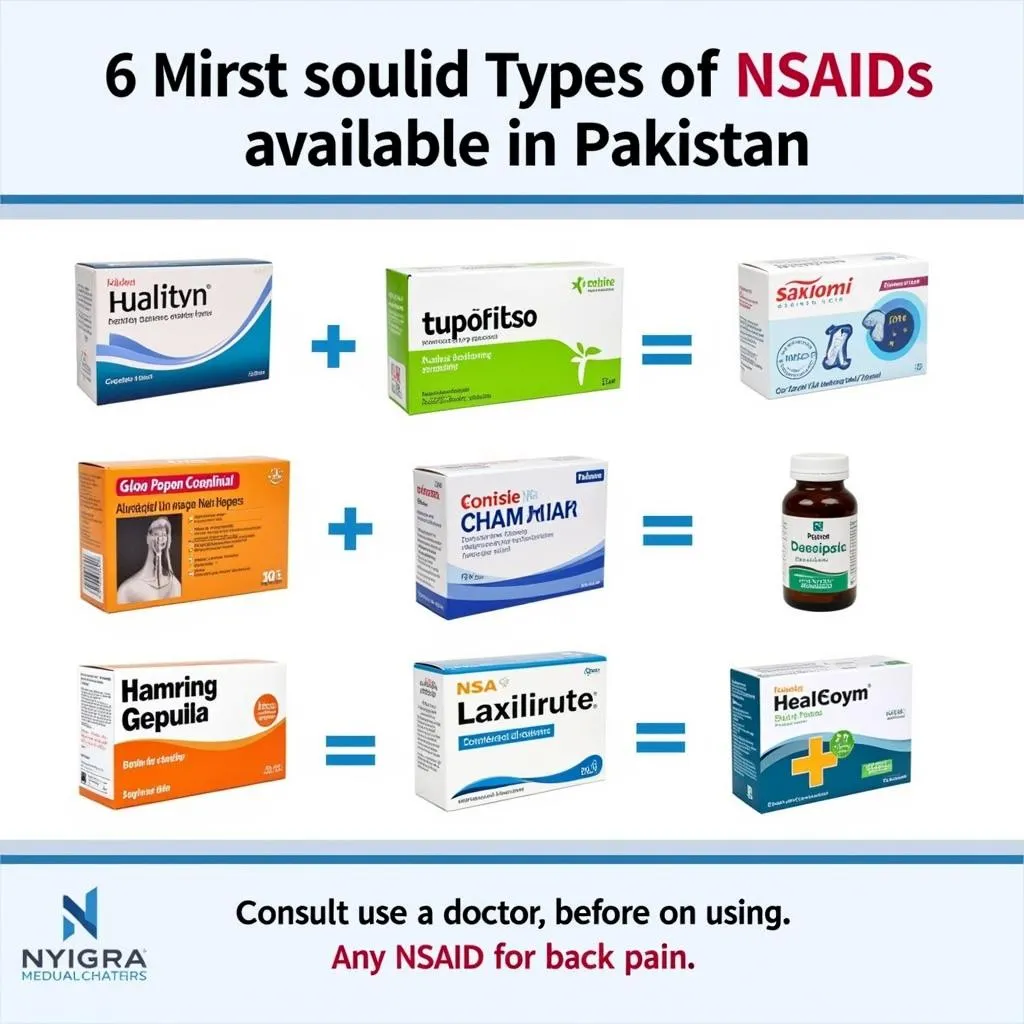Back pain is a common ailment that affects millions of people worldwide, including Pakistan. While there’s no one-size-fits-all solution, over-the-counter (OTC) pain relievers, commonly known as “back pain tablets,” can offer temporary relief. This guide will explore the different types of back pain tablets available in Pakistan, their effectiveness, potential side effects, and important considerations for safe and effective use.
Types of Back Pain Tablets in Pakistan
Several categories of back pain tablets are widely available in Pakistan, each working in slightly different ways:
Nonsteroidal Anti-Inflammatory Drugs (NSAIDs)
 Pain Relief Tablets in Pakistan for Back Pain
Pain Relief Tablets in Pakistan for Back Pain
NSAIDS are often the first line of treatment for back pain. They work by reducing inflammation and pain signals in the body. Common NSAIDs in Pakistan include:- Ibuprofen (Brufen, Combiflam): Ibuprofen is a widely used and effective NSAID for back pain relief.
- Diclofenac (Voltaren, Diclo): Diclofenac is another popular NSAID with strong analgesic and anti-inflammatory properties.
- Paracetamol (Panadol, Crocin): While not strictly an NSAID, paracetamol is often used for mild to moderate back pain. It primarily relieves pain without significant anti-inflammatory effects.
Muscle Relaxants
Muscle relaxants are helpful for back pain caused by muscle spasms. They help relax tense muscles, reducing pain and stiffness. Common muscle relaxants in Pakistan include:
- Cyclobenzaprine (Flexeril): Cyclobenzaprine is a common muscle relaxant available in Pakistan.
- Baclofen (Lioresal): Baclofen is a centrally acting muscle relaxant.
- Tizanidine (Zanaflex): Tizanidine is another muscle relaxant that may help with back pain.
Opioids
Opioids are potent pain relievers used for severe back pain. However, their use is typically reserved for short-term pain management and should be prescribed and monitored by a doctor due to their addictive potential and potential side effects. Common opioids available in Pakistan include:
- Tramadol (Ultracet, Tramal): Tramadol is a synthetic opioid that is often used for moderate to severe back pain.
- Codeine (Codine): Codeine is an opioid that is commonly used for moderate pain, often in combination with paracetamol or ibuprofen.
Choosing the Right Back Pain Tablet
Choosing the right back pain tablet requires careful consideration and consultation with a healthcare professional. Here are some key factors to keep in mind:
- Severity of your pain: Mild to moderate back pain can often be managed with NSAIDs or paracetamol. Severe or chronic back pain may require stronger medications, including opioids, prescribed by a doctor.
- Underlying cause: Identifying the cause of your back pain is crucial. For example, back pain due to muscle strains may respond well to muscle relaxants, while back pain caused by arthritis may benefit from NSAIDs or other pain management strategies.
- Existing medical conditions: If you have any pre-existing medical conditions like kidney or liver disease, heart problems, or stomach ulcers, you’ll need to discuss your options with your doctor before taking any back pain medication.
- Potential side effects: All medications have potential side effects, and back pain tablets are no exception. Common side effects can include nausea, stomach upset, dizziness, drowsiness, and liver or kidney damage.
- Interactions with other medications: If you are taking any other medications, including over-the-counter drugs and herbal supplements, inform your doctor before taking back pain tablets. Some medications can interact with each other, potentially leading to adverse effects.
Back Pain Tablet Safety Tips
Following these safety tips can help you use back pain tablets safely and effectively:
- Always read the label and follow directions: Never exceed the recommended dosage and do not take back pain tablets for longer than the prescribed period.
- Store medication properly: Keep all medications out of reach of children and store them in a cool, dry place.
- Talk to your doctor about any concerns: If you experience any unusual symptoms, persistent side effects, or if your back pain worsens, consult your doctor immediately.
FAQ about Back Pain Tablets in Pakistan
Here are some frequently asked questions about back pain tablets in Pakistan:
- Q: Are back pain tablets safe for long-term use?
- A: Long-term use of back pain tablets, especially NSAIDs and opioids, can lead to side effects like stomach ulcers, liver damage, and kidney problems. It’s important to discuss long-term use options with your doctor.
- Q: Are back pain tablets effective for everyone?
- A: While back pain tablets can provide relief for many people, their effectiveness varies depending on the individual and the cause of their back pain.
- Q: Can I buy back pain tablets over the counter in Pakistan?
- A: Yes, many back pain tablets are available over the counter in Pakistan. However, it’s always recommended to consult a healthcare professional before taking any medication.
- Q: What should I do if I have back pain that doesn’t improve with medication?
- A: If your back pain doesn’t improve with medication, consult your doctor. They may recommend additional treatments, such as physical therapy, chiropractic care, or other therapies.
Remember: Back pain tablets can provide temporary relief, but they are not a cure for back pain. It’s important to address the underlying cause of your pain and to manage your condition holistically. If you have any concerns about back pain, consult a healthcare professional for proper diagnosis and treatment.